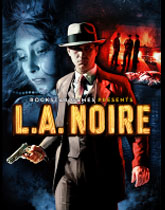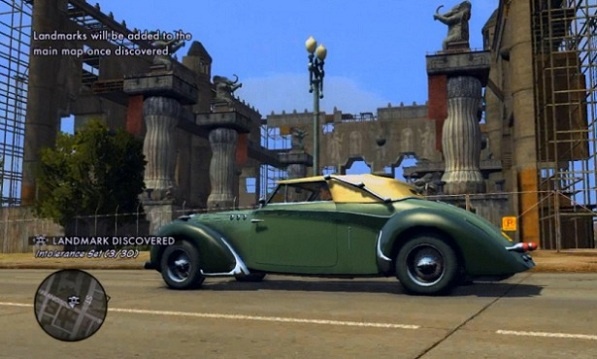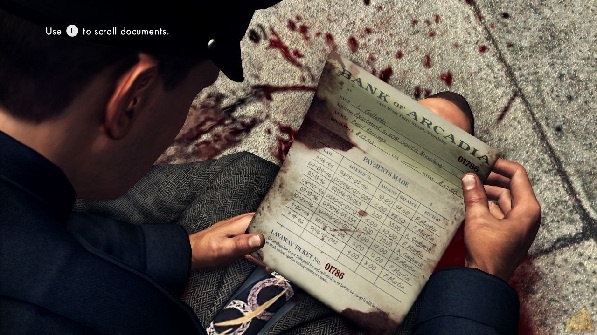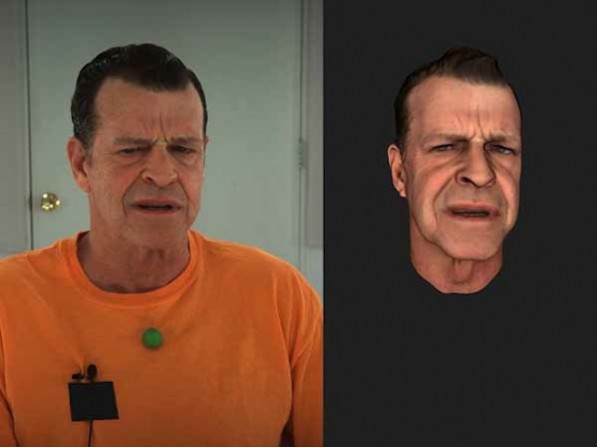 Review by Brandon “Dix” Perdue
Review by Brandon “Dix” Perdue
L.A. Noire
Developer Team Bondi & Rockstar Games
Publisher Rockstar Games
Released May 2011
Available for PS3 (version reviewed), Xbox 360
Time Played Finished all cases, including 3 DLC cases (20+ hours)
Verdict:  4/5 Thumb Up
4/5 Thumb Up
One of the best detective games to date…but not quite the stuff dreams are made of.
Old Dogs, New Tricks
There’s a lot of things I can say about L.A. Noire, but since it might save some readers time, I’ll start with this: this game is not Grand Theft Auto with a badge, nor is it Red Dead Redemption thirty years later. If you’re expecting the same kind of violent shooting action, you’ll be disappointed most of the time. It’s all here, but it’s not what L.A. Noire usually gets up to.
This is a game made for people like me. The sort of people who justify the number of police procedurals on network television. The sort who really want you to be as intrigued as we are by the Zodiac killer. The sort that don’t need a reason to hum the theme to Dragnet. At its core, L.A. Noire is a police procedural game: find clues, question suspects, follow leads, repeat. And mostly these sequences are not terribly sensational: more Dragnet than Castle or CSI. The occasional foot chase or car chase or gunfight breaks out, but protagonist Cole Phelps is not Max Payne.
And actually, it’s the fact that this isn’t Grand Theft Auto that most often causes L.A. Noire to stumble – because it sure looks like Grand Theft Auto and sometimes plays like it too. Consequently, some gameplay features seem curiously out of place, or even completely extraneous and, dare I say, pointless.
Just the Facts, Ma’am
For what it is, the core formula works. The cases are interesting enough, and often paced reasonably, and occasionally very well. The clue-finding mechanics, which basically have Phelps wandering around a crime scene waiting for the controller to rumble, manages to be engaging; a clever use of the game’s score signals when all clues have been found. Occasionally some clues have to be manipulated a little, taking the form of a small puzzle; one early case has Phelps reassembling the pipes on a heating unit. These aren’t exactly mind-benders, but they vary up the gameplay from time to time.
The real star of the investigative show, though, is the interview system. On its surface it’s not that unlike the kind of conversation systems that have existed in adventure games and RPGs for the better part of twenty years: Phelps has a list of topics he can engage in any order, one by one. But after the interviewee has given his or her response, Phelps has to choose to believe their statement entirely, to dig for something they aren’t saying outright, or to accuse them of lying (which requires that he select the clue, gathered earlier, that contradicts the statement. Too bad he doesn’t shout “Take that!”). Some part of this process is paying attention to the clues that Phelps has uncovered so far, some of it is watching the suspect – many will look visibly nervous when they are lying or withholding information, though some are better liars than others – and some is, honestly, sort of guessing. It’s an interesting system and has its nuances, which can be frustrating, but it’s also really rewarding to read a suspect like a book.
The last new mechanic is intuition, a pool of points that Phelps can employ to reveal all the clues at a crime scene on the minimap (occasionally useful for when there’s some really well-hidden clue) or to help in interviews. The latter is the interesting (and more useful) bit: Phelps can choose either to eliminate one of the three possible answers or to find out how all the other players logged into the Rockstar Social Club answered, by percentage. (It would probably show my age to point out that these are basically two of the three lifelines from Who Wants to Be a Millionaire?, so I won’t.) Intuition is earned as crime scenes, interviews, cases, and side objectives are completed.
Don’t get me wrong: there’s still a lot of room for improvement here. But in the surprisingly sparse history of detective games, these mechanics are more engaging than any others I’ve encountered.
The Faces are Familiar
Perhaps L.A. Noire‘s single most notable achievement is its use of its extensive cast. The cast not only provides the voices for their characters but frequently their likeness, and this makes L.A. Noire appear very diverse. Anyone who watches much television should expect to see a familiar face or two, like Heroes‘s Greg Grunberg, amongst the “guest stars” that appear in each case. There are games out there that have better character animation – Call of Duty: Black Ops or Uncharted 2: Among Thieves, for instance – but in terms of the sort of overall effect it has on the game, L.A. Noire really takes the cake.
If anything, this all only reinforces the television-like quality that already exists courtesy of the game’s many episodic cases. Honestly, it almost makes me wonder why L.A. Noire wasn’t what it maybe should have been – an episodic game. (Well, okay. Episodic games, in general, haven’t been terribly successful, so that’s probably the pragmatic reason why.)
The point is, whatever else can be said of L.A. Noire, this is progress that Team Bondi can be proud of.
The City of Angels
However, not all is well in Los Angeles, but fortunately you can drive around in it to set things right. Aside from the main cases – of which their are 21 in the game and 3 available for download, with 2 more promised in the next few months – there are street cases, small side quests that usually encompass a single action sequence: shooting it out with a group of bank robbers, pursuing a would-be mugger across rooftops, chasing a car thief through the streets. These are fun, quick diversions, especially during times when the main case isn’t serving up the action as much as you might like. They also garner experience towards intuition points and other benefits.
But besides these things, the open world nature of L.A. Noire seems completely extraneous. Because the main cases are completely linear and there are no other side quests to speak of, driving from place to place is merely a formality. Yes, occasionally Phelps will chat over the case with his current partner, but beyond that there’s really no point to the driving time. Side tasks that come with this travel, like finding various Los Angeles landmarks and locating 50 hidden golden film canisters, are poorly implemented and not remotely incentivized unless you’re a slave to the trophy system. It doesn’t help that there’s no apparent in-game clues to these tasks, which, in a world as large as the reproduction of 1947 Los Angeles is, makes them exercises in tedium.
Phelps can drive other cars, and there are 95 to choose from, but let’s face it: this is the 1940s. There are not 95 interesting cars in the 1940s. Indeed, many of the entries on the list are simply the two- and four-door versions of the same car. Again, since there’s no real point to the driving, there’s little incentive to find vehicles that handle differently – especially since car chases will almost always drop you back in your police car, which will usually be a better choice in any case.
The good news is that Phelps can have his partner drive to locations, thus skipping all the travel time (unless they have a conversation, in which case they’ll have it while you watch). This makes most of these shortcomings excusable. Players who drive everywhere will probably be left with the distinct impression that this game is trying to be something that it’s not, and trying only half-heartedly besides.
Cement Overshoes
Which brings me to the real issue with L.A. Noire: the narrative. It’s kind of a shambles, really, and as near as I can tell this is also because of some sort of identity crisis. Parts of the game feel like the narrative direction was toward an effective, episodic crime story, revealing each case that Phelps cracks. Other parts are decidedly directed towards a limp, overdone game narrative linking many cases. I think both of these things could coexist, if done right; but in L.A. Noire, they were not.
Some cases stand on their own. They start and end within a few hours, tied up nicely (or not so nicely, depending on how well Phelps did with putting clues together and running down suspects) and then filed away, never to be seen again. These cases are the best in the game, almost categorically. They also happen to include the (well worth it) DLC cases.

Los Angeles 1947 is big, pretty, painstakingly reconstructed, and you can drive around in it. I'm just not really sure why.
Some cases, especially those late in the game, feel compelled to fit into a larger narrative, and there’s a few problems with this. First and foremost is that these larger narratives (it happens more than once!) are unsatisfying. The first is cheap, frankly, and it seems like the writers realized this and, instead of fixing it, decided to keep it and just try again later in the game. The second is larger, ties together more of the game, and would have been okay if it didn’t dominate a full quarter of the game. The result is one of those instances that plague many mystery games, when the player will inevitably know whodunit hours before the characters but be helpless to do anything about it. This is not helped by the plot revelations that come as easily as the game’s first crime scene through newspapers that Phelps can locate, prompting a cutscene to play that doesn’t seem to have anything to do with anything – at least until late in the game.
Phelps himself hardly helps. He’s one of those game protagonists that will be forgotten long before L.A. Noire itself is. He’s not irritating; he’s just not interesting. Much of his story is told in flashbacks to his time as a Marine at Okinawa, and this eventually has interesting revelations, but it’s too little, too late. The rest of the game’s cast are fairly colorful, including Phelps’ partners, but to paraphrase one of them, he changes partners too fast to learn their names. The game would have been better served to have some consistent character besides Phelps, but as it is the second most consistent guy in the game is the coroner. The dialogue is solid and the interactions between Phelps and his partner-of-the-week entertaining enough, and the plot of the cases usually will keep things engaged. There’s just no character to give this game it’s anchor: try as they might to make us care about Cole Phelps, he’s just not John Marston. Not by a long shot.
Conclusion
L.A. Noire is very much like the game I’ve been waiting for for years. It’s remarkable to me how few detective games exist at all, much less how few of them work well. And I really really want to love L.A. Noire as much as I would love that hypothetical game. There’s just one too many missteps.
But let me not be misunderstood: L.A. Noire is a technically proficient, and sometimes impressive, game. It’s also a bit different without being shockingly different, and in the end it does scratch that detective itch. There’s a lot of good here, and a lot of promise for more DLC and/or a potential sequel, if the developers learn a little from this first attempt.
If you are looking for Grand Theft Auto, steer clear. But if you’ve always wanted to star in a police procedural, there’s no game I can recommend more than L.A. Noire. You just have to keep your expectations in check. It’s not everything it could be, but what it is is fresh, surprising, and kinda neat.



Outstanding review. Welcome aboard, Brandon!
This is a great place to start. I’ve been intrigued by LA Noire, but have held off for some of the very concerns you outline here. Thanks!
Assuming that you are serious about “I know I’ve seen this guy somewhere before. What was this guy in? WHAT WAS HE IN?”… Fringe, Dr. Walter Bishop.
OF COURSE! Denethor! Geez. I couldn’t place him either. I should turn in my nerd card right now.
Great review.
Sometimes it’s easy to review games. Unlike music or film, where opinion of literally every track from an album or scene from a film comes down to subjective taste, games are often built around more mechanical elements. Good game design – or perhaps more crucially, bad game design – are more often than not more uniform decisions. Games still have enough about them to split opinion or create talking points, don’t get me wrong, but often games will live or die based on how their most crucial innards work.
Then along come games like Heavy Rain. I wrote a review of Heavy Rain as my first piece for Tap, and I found it to be a game that defied convention. Although it had numerous flaws in terms of gameplay, control and story, I thought the overall experience was so incredibly compelling and so engaging that I almost couldn’t fault it.
I have to say that L.A Noire gave me a similar vibe. Yes the shooting and chase sequences were GTA levels of awkwardness, even feeling out of place in parts, but the overall feel of the experience felt fantastic to me. The detective element was fudged in a lot of ways (seeing Cole go schitzo over your “Doubt” choice is my personal favourite thus far) and I don’t think the over arching story is that fantastic, but I’m just so relieved to play a game which is mature, thoughtful and clever about the way it comes across. Team Bondi nailed the setting, the facial tech is stunning and the soundtrack is “head off straight to iTunes and purchase” good.
I’ve not finished the game yet and in terms of raw gameplay mechanics I have a long list of complaints, but as far as the actual experience of sitting down to get involved with the game goes I can’t say I’ve enjoyed a game as much as this since Heavy Rain. It has a similar sort of flawed yet “industry benchmark” quality to it.
Just as my 2 cents, I’ve also been playing the game in black & white, which is a filter from the options. Be it on your first play through or a second run, I’d easily recommend playing the game this way. I toyed with both visual settings during the early parts of the game but found B&W added so much to my experience. It really adds to the atmosphere and in my opinion even covers up for some of the standard games more “ugly” areas. L.A Noire is never a bad looking game, but in B&W I found the lighting in particular came into it’s own. The whole game feels like a more unique and true experience to me whilst playing in black and white.
Again, great review and welcome to the team.
Solid review. Great stuff!
This may actually convince me to take the plastic wrapping off the copy of “La Noire” that’s been sitting in my family room for the last 2-3 weeks or so.
Great review, Brandon.
Glad to see Team Bondi pull this together. The game was quite long in the making, and unfortunately Team Bondi received a lot of sledging as a result of this and other matters.
I visited their studio maybe two years ago, and the people I met there were kind and friendly. Looking forward to seeing what Team Bondi can come up with next.
I’ve read a fair few reviews of LA Noire and this ranks up there with the best of ’em.
From what I’ve gathered LA Noire seems to occupy an uncomfortable space between the heavily scripted sequences and open world of GTA and the intimacy and focus of Heavy Rain.
Heavy Rain really got the balance right for me. It pretty much coasted on QTEs from start to finish and it was a format that worked very well with the breadth and variety of interactions — at no point did I want to (or more importantly need to) directly drive a car or fire a gun or go off exploring the (largely irrelevant) city or faff about with items in my inventory. It was lean and pacy and nearly every interaction served some sort of purpose.
I’m still undecided on whether I should take the plunge with this. It looks and sounds great but I get the impression that it’ll rub me up the wrong way…
Anyway, excellent review Brandon, thanks!
Yes, Gregg, I think you hit the nail there with the comparison to Heavy Rain. While QTEs are an imperfect way to interact with a game world, they were pretty organic in Heavy Rain. And they way they were used actually worked: that section where you DO drive a car, down the highway in the wrong direction, had my heart pounding more than any chase in GTA IV.
Meanwhile I’m very intrigued by the nature of LA Noire, the type of conversational puzzle-solving it puts forth, but Dix here really isolates some valid concerns about the “rest” of the game. While I believe, based on this review, that it’s a very good title, I also got the sense that it’s not yet the epitome of what we might see in games of this type.
You’re right to think that, Matt. Compared to the rest of the current market L.A Noire is a pretty compelling and unique experience, much like Heavy Rain was when that landed, but as a crime solving detective romp it’s not perfect, even within it’s own and relatively isolated genre.
It’s not as refined in terms of it’s main aims as Heavy Rain was. I’m not really sure what the final extent of Rockstars involvement with the games development was, but some of the unnecessary distractions feel lifted straight from a typical R* experience. I know a lot of people hated the vehicle sections – I got along with them OK – but I thought the hand to hand combat sequences felt particularly forced and out of place. The on foot chase sequences were pretty clunky too, although I loved the chase music so much they always brought a smile to my face regardless.
If we get another Noire title from Team Bondi (and I sincerely hope we do), I hope it becomes a more streamlined and focused improvement on what we have now. Heavy Rain wasn’t a perfectly executed game in terms of gameplay mechanics but it always stuck to it’s principles. Ditch some of the distractions and improve the questioning element, and I think Team Bondi will be on to a real winner. L.A Noire certainly isn’t the epitome of this style, buts it’s a solid (and fairly easy to recommend a play through) base to build on.
While I’m hesitant to throw in too much with the Heavy Rain comparison – I think the similarities are fairly superficial – I agree that there’s definitely a lesson to be learned from what makes Heavy Rain work where LA Noire doesn’t. LA Noire feels too much, too often like a game that could stand on its own shoehorned into a recognizable, successful model. I’d be curious to know why this is – it may well have not been a design decision, but rather a publishing one.
We have to accept the unfortunate reality that sometimes we can’t attribute decisions, good or bad, to the team building the game. I think LA Noire could have been a greater game without the open world stuff, but it might have also been a game that would have been hard to find a publisher for, and we may never have seen it at all.
Nice review Brandon.
I have mixed feelings on L.A. Noire. When I first started the game I was captivated by its unique play mechanics and the great atmosphere and environments. Combing over a crime scene, questioning witnesses and then interrogating suspects was very refreshing and exciting.
But the more I played it the more I started feeling that all these elements were far more transparent then I initially thought and that my performance in them had very little effect on the outcome of the case, just on my “rating” at the end. Things began to feel more formulaic (witnesses lying for seemingly no reason, every other “suspect” fleeing, etc.) to the point where the game became predictable and very “gamey”.
I am currently assigned to Vice and I have lost most of my desire to go back to it. Which is a shame, because I was having a really good time with it initially.
@tanis38: the unfortunate thing is, the BEST Vice case, by far, I think, is “The Naked City,” one of the DLC cases. It’s pretty good, actually – no incredible surprises, but it has an interesting plot to it.
I feel like this fact speaks to the way the game feels sort of jammed into the release shape it’s in, rather than organized/distributed/written in ways that might’ve made more sense on a lot of levels.
Excellent review. Communicates everything it needs to, and doesn’t go on for too long. On a personal note, thankyou – you provided exactly what I needed to decide whether or not I’m interested in this title, and confirmed my suspicions. It’s a ‘oneday’ game.
Great review, I’m finally catching up!
I love the premise of the game but during reviews I always felt it would falter, especially with what you mentioned about the player having the ability to guess long before your allowed to.
I’m a huge fan of murder mysteries and this would have been up my street, if I owned a console that is!
Looking forward to reading more from you 🙂
i just made homocide and i have explored the city. la noire is a rental with almost no replay value.
great graphics and facial expressions . the detail of the street pavement was outstanding. how ever when does the fun begin,when does my actions really effect anything,and where is my safe house and garage.
maybe rockstar can recycle another game out of the well rendered 1947 L.A like they did with liberty city from gta 4. think Amboy Dukes with early 20’s characters with good and bad cops like la confidential.
la noire could of been an awsome game instead of just a mediocre game with awsome graphics.
I read over on Game Boomers last night that LA Noire will be released for PC. I will play it. Noir is one of my favorite movie genres. And many years ago there was a game called Noir. I was immediately intrigued. But it took me months to find a copy and I expect I paid a premium for. With no regrets. It was very well done. It was in black and white and took you right back to the basics like Dashiell Hammet, Raymond Chandler, Sunset Strip etc etc etc. So I look forward to this one but with limited expectations. And it doesn’t bother me that people say this is a one day game. I have played so many one day adventure games that I cannot not count them. To me the big surprise came when I played the first Thief game and it took me 4 months. That was a paradigm shift. Kay Thomas